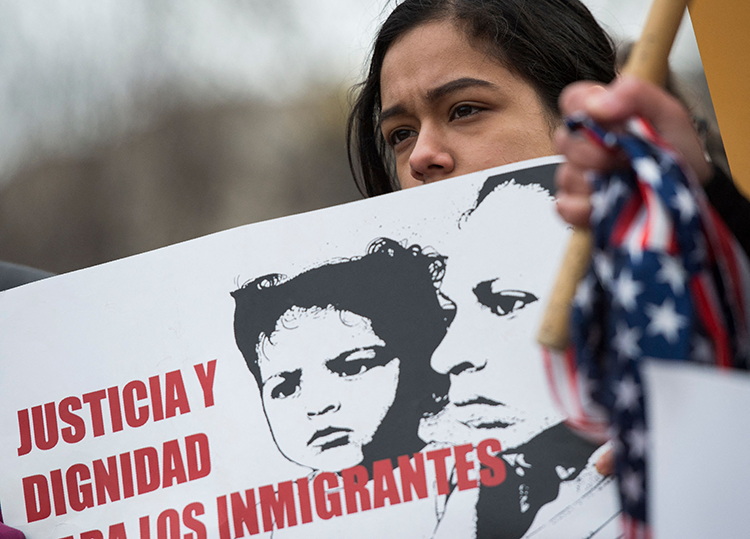Extra protections are needed for youths navigating immigration system, ABA House says

(Photo by ANDREW CABALLERO-REYNOLDS/AFP via Getty Images)
The federal government should better protect immigrant youths, and particularly immigrant youths of color, through the yearslong adjudication of their Special Immigrant Juvenile Status petition and adjustment of their status application to lawful permanent residence, the House of Delegates said at the ABA Midyear Meeting in Louisville, Kentucky, on Monday.
The Commission on Immigration submitted Resolution 605, which calls on Congress and President Joe Biden’s administration to:
• Eliminate the consent function in the Special Immigrant Juvenile Status statute—which provides U.S. Citizenship and Immigration Services the authority to consent to the grant of the status—and ensure adjudicators do not use the function to disparately impact children’s applications.
• Ensure Special Immigrant Juvenile Status youths are protected from removal and receive access to employment authorization and federal public benefits while they wait to adjust their status to that of a lawful permanent resident.
• Amend the Special Immigrant Juvenile Status statute to remove the discretionary component and other barriers to status adjustment, including by allowing a child’s case to first be heard by a nonadversarial adjudicator, limiting the grounds of inadmissibility and expanding the waiver of inadmissibility grounds.
• Require all adjudicators of Special Immigrant Juvenile Status petitions and Special Immigrant Juvenile Status-based adjustment of status applications to receive training on adjudicating cases in a trauma-informed and nondiscriminatory manner.
“SIJS is a humanitarian status that provides protection and a pathway for permanent residency and eventual U.S. citizenship for immigrant children up to the age of 21 who have been abused, abandoned, neglected by at least one parent and where a state juvenile court has determined that it is not in the best interest for that child to be returned to their country of origin,” said Michelle Jacobson, the chair of the Commission on Immigration, who introduced the resolution.
Follow along with the ABA Journal’s coverage of the 2024 ABA Midyear Meeting here.
Eligible children who receive Special Immigrant Juvenile Status can apply for lawful permanent residence once a visa is available, but the number of visas allotted to these children is limited by statute. Special Immigrant Juvenile Status youths faced an annual per-country visa cap, and as a result, many from El Salvador, Guatemala and other countries have been waiting to apply for lawful permanent residence since 2016. Today, youth from all countries are subject to the backlog.
According to U.S. Citizenship and Immigration Services data, which is cited in the report that accompanies the resolution, nearly 120,000 youths with approved and pending Special Immigrant Juvenile Status petitions were stuck in the backlog as of July.
In 2022, the Biden administration moved to better support Special Immigrant Juvenile Status youths by providing those in the backlog with an approved petition for deferred action, which would protect them from physical removal from the United States while they wait for visa availability, Jacobson said.
“Despite these protections afforded by the updated regulations and consideration of the deferred action, additional steps are still needed to ensure the SIJS youth receive the goal of permanent residency through Congress,” she added.
Resolution 605 builds on several other ABA policies that aim to protect Special Immigrant Juvenile Status youths. This includes a measure adopted by the House in 2021 that opposes their removal from the United States once a court has determined they cannot be reunified with a parent or returned to their country of origin; and U.S. Citizenship and Immigration Services has approved their Special Immigrant Juvenile Status petition.
The 2021 measure further urges the government to enact laws and policies that exempt Special Immigrant Juvenile Status youths from limits on visas—or alternatively increase the number of visas available and lift the per-country cap on them; grant deferred action to these youths; authorize employment upon approval of their Special Immigrant Juvenile Status petition; and provide guidance to judges handling cases for youths who are waiting for visas to become available.
The House overwhelmingly adopted Resolution 605. Its co-sponsors include the Commission on Hispanic Legal Rights and Responsibilities, Commission on Homelessness and Poverty and Commission on Sexual Orientation and Gender Identity, among others.
See also:
“Meet the two Texas attorneys behind the Children’s Immigration Law Academy”
“ABA Commission on Immigration offers students ‘hands-on’ experience with people in detention”
“For 30 years, ProBAR has served immigrants and refugees at the southern border”
Updated on Feb. 5 to clarify information about the backlog.
Write a letter to the editor, share a story tip or update, or report an error.



